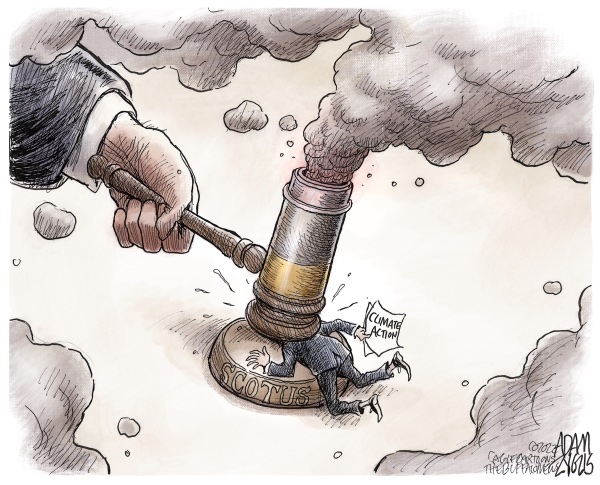What can one say about the recent U.S. Supreme Court ruling, that the Environmental Protection Agency (EPA) cannot regulate the release into our atmosphere of climate-changing gases? The court’s 6:3 majority said that this is properly a task for the U.S. Congress.
They are handing the enormously complicated task of reversing the our nation’s greenhouse gas emissions to a body of legislators that currently gets almost nothing done, because of partisan gridlock and a 50:50 Senate. Have these judges heard what a short timeline is remaining, to halve our nation’s contribution to global heating? Have they thought about how much climate mitigation work needs to be done? Have they paid any attention to the fact that global heating is always accelerating faster than our predictions? Do they not have children whose future they care about?
None of this matters to them, clearly. You’d think that the five justice Supreme Court majority, who coincidentally are far-right Catholics, would have read about the biblical end-times — you know, where the Earth is plagued by fires and floods and pestilence. Which are pretty much our future under accelerated global heating.
But biblical judgment is not the cause of global heating, rather it’s the stranglehold on political power in Washington, D.C., exerted by the fossil fuel industry. Not just drowning government regulations in the bathtub, but also willfully drowning low-lying areas all across the planet.
Congress can of course enact new climate laws, but clearly serious climate legislation will go nowhere in D.C. until the climate-focused Democratic party (minus Joe Manchin) has majorities in the House and Senate. With an immense amount of work, this might just come about in the November elections. Always the optimist, can’t help it.
It does seem obvious that the Republican Party’s global heating denial will at some point come back and do perhaps terminal damage to their future, but that is likely further off.
What has the EPA got that Congress has not? Scientists and engineers, over 7,000 of them. Somehow these world-class experts in pollution mitigation are not the ones to determine our nation’s climate policy, according to the Supreme Court majority. It’s like taking the A team off the field, but there’s no B team. This is calculated insanity.
Justice Elena Kagan, in the minority, said, “The court appoints itself, instead of Congress or the expert agency, the decision-maker on climate policy. I cannot think of many things more frightening.”
Senator Sheldon Whitehouse (D-R.I.), the Senate’s most outspoken climate activist, has documented that hundreds of millions of dollars of dark/unknown origin were spent on the nominations and confirmations of the three Supreme Court justices appointed by our recent president. The Koch brothers’ Americans for Prosperity organization helped run these campaigns. They advocate for fossil fuel extraction. That would explain a lot.
Once again, why is the U.S. so important in the movement to counter climate change? Because we caused most of it. Period. Researchers at Dartmouth have completed a complex study that paints the U.S. as the greatest single contributor to global heating, bearing responsibility for $1.9 trillion in climate damages since 1990. Damages such as those from extreme weather, lost wages, property destruction, and the like. This fits the unfairness picture just perfectly. The rich nations in the north – the U.S., Europe and Japan – are the prime causers of global heating, but the poorer southern nations are bearing the brunt of the worst weather consequences, with few resources to respond with.
The New York Times in mid-July described four ways that President Biden may still advance a less-ambitious climate agenda. He has told the EPA to regulate tailpipe emissions from cars; these regulations are a year or two away from being finalized, but meanwhile they will stimulate automakers to design, produce and sell ever more electric vehicles. The EPA still plans to require power plants to make modest cuts to their greenhouse gas emissions.
Methane is a terrible climate pollutant. It does not last as long in the atmosphere as does carbon dioxide, but for its first 20 years there, it is 80 times more potent than carbon dioxide.
The EPA is preparing strict new regulations on widespread methane leaks from oil and gas facilities. It’s expected that these regulations will withstand legal challenges. Stopping methane leaks is a real and enormously important short-term step in the right direction.
Lastly, individual states can still advance climate mitigations. California is a leader, and is expected soon to announce that all new cars sold in the state by 2035 be electric or zero-emission. Twenty-one other states are advancing related rules, some stricter than California’s.
The Supreme Court’s majority has stripped from our nation the capacity to lead the world in climate mitigation, when there is less than a decade left in which to reduce greenhouse gas pollution by half, to keep our planet habitable. Our leadership is vital in this effort. Now we have nothing to bring to the table of climate negotiations. Not a legacy for a justice to be proud of, surely.

